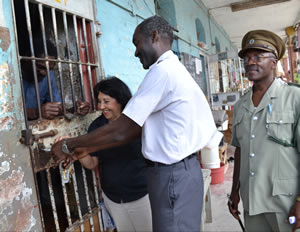Food For The Poor Offers Nonviolent Prisoners a Second Chance at Easter Holy Week
Untitled Document
 | |
In Jamaica, the fines of two of the inmates Food For The Poor paid to release were less than $5. | |
Related Item: | |
COCONUT CREEK, Fla. (April 17, 2014) – During Easter Holy Week, Food For The Poor released 68 prisoners in Guyana, Haiti, Honduras and Jamaica. These prisoners were incarcerated due to their inability to pay the required petty fines. This second chance at a new life rescued many from spending years longer in jail than their prison sentences would require.
In Guyana, nine inmates were released on April 14 from Georgetown Prison, Timehri Prison and New Amsterdam Prison. The Superintendent of Prisons in Guyana surprised the prisoners when he announced the charity’s donors had paid their fines, and they were to be released in time to celebrate the resurrection of Christ with their families.
Twice a year – during the week of Christmas and during Easter’s Holy Week – the Food For The Poor Prison Ministry Program releases inmates who have committed minor offenses. The ministry is based on the scripture, “…I was in prison and you visited me,” (Matthew 25: 31-46).
“We pray the released inmates will recognize that God is merciful, and He is a God of second chances,” said Robin Mahfood, President/CEO of Food For The Poor.
Mahfood, who spoke to the men selected to be released via Skype, said, “We have a very serious mission to follow God’s mandate to love one another. God loves you tremendously. Food For The Poor’s staff and I pray that you never return to prison.”
Paulette Charles, a member of Food For The Poor-Guyana’s Board of Directors, cautioned and challenged the prisoners to live a life changed, and encouraged them to make time to speak with God. She reminded them that this can be done anywhere – not only in a place of worship.
Earlier Monday morning, God answered the prayers of eight inmates in a prison in San Pedro Sula, Honduras. They were also released to be reunited with their families in time for Easter. Prior to their release, each prisoner wrote a note of gratitude to Food For The Poor’s donors. The exercise allowed them to reflect on their past decisions, and the circumstances that led to their imprisonment. Many described growing up on the streets, and how as their dependence on drugs increased, they began to lose control of their lives. Unanimously, they wrote that they want to become better people, and to be able to offer their children a different life.
Prison conditions are drastically worse in developing countries than they are in the United States. Overcrowded prisons are common, and perpetuate the spread of disease and violence. The potential spread of cholera in Haiti’s prisons remains a concern.
Most of the 30 prisoners released in Haiti this Easter Holy Week from the barracks in Cap-Haitien, were jailed because they stole items to provide food to feed their starving families.
One inmate said men came to his house to accuse him of stealing yucca. He said he sold whatever he could to prove his innocence but no one would listen. He is anxious about what circumstances wait for him at home after serving 12 months, and receiving reports that he has lost three of his six children. He said his release is an answered prayer, and he continues to believe justice will prevail.
On Wednesday, April 16, 21 inmates were released from several prisons and police stations in Jamaica. Many of the misdemeanors included traffic offenses and praedial larceny – the theft or vandalism of agricultural produce and or livestock.
Sandra Ramsey, Food For The Poor-Jamaica’s Prison Ministry Administrator, asked the 11 men selected to be released at St. Catherine Adult Correctional Centre in Kingston, to show Food For The Poor’s donors their appreciation by not returning to prison.
“Our donors work hard to provide this gift for you,” said Ramsey. “Learn to hold your tempers and try and sort things out without fighting. This Easter go to church and thank the Lord for what He has done for you.”
Since the inception of Food For The Poor’s Prison Ministry Program in Jamaica in 1998, the charity has assisted in freeing, training and reintroducing prisoners back into the community as productive citizens. Prison authorities have found Food For The Poor’s Prison Ministry Program to be so successful that they have implemented a similar program themselves. Some prisons now offer inmates jobs in the prison where they are held so that they can earn money to pay off their fines.
As the prisoners were released, Food For The Poor representatives and partners prayed with them for God’s forgiveness and blessing. Just prior to their release, they are fed a warm meal, and given a stipend for transportation costs and groceries to take home to their families.
To support Food For The Poor’s Prison Ministry Program, checks payable to Food For The Poor can be mailed to 6401 Lyons Road, Coconut Creek, Fla. 33073. Please include reference number “SC# 74122″ to ensure your donation is correctly routed.
Food For The Poor, named by The Chronicle of Philanthropy as the largest international relief and development organization in the nation, does much more than feed millions of the hungry poor in 17 countries of the Caribbean and Latin America. This interdenominational Christian ministry provides emergency relief assistance, clean water, medicines, educational materials, homes, support for orphans and the aged, skills training and micro-enterprise development assistance, with more than 95 percent of all donations going directly to programs that help the poor. For more information, please visit www.FoodForThePoor.org.
Jennifer Leigh Oates
Food For The Poor
Public Relations
954-427-2222 x 6054
[email protected]


